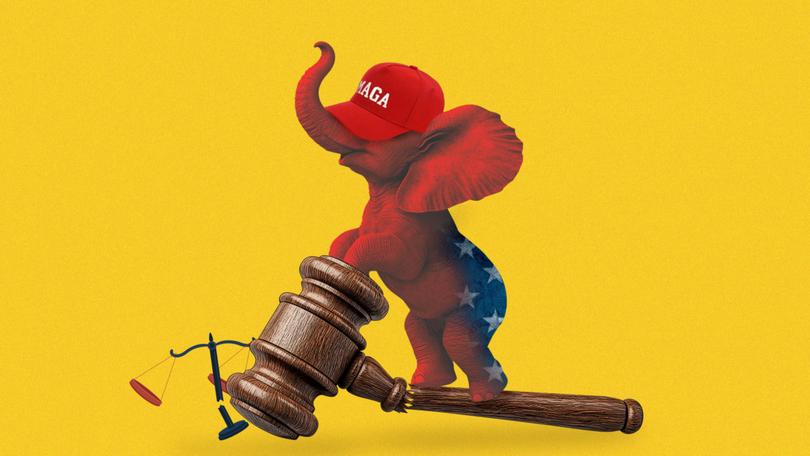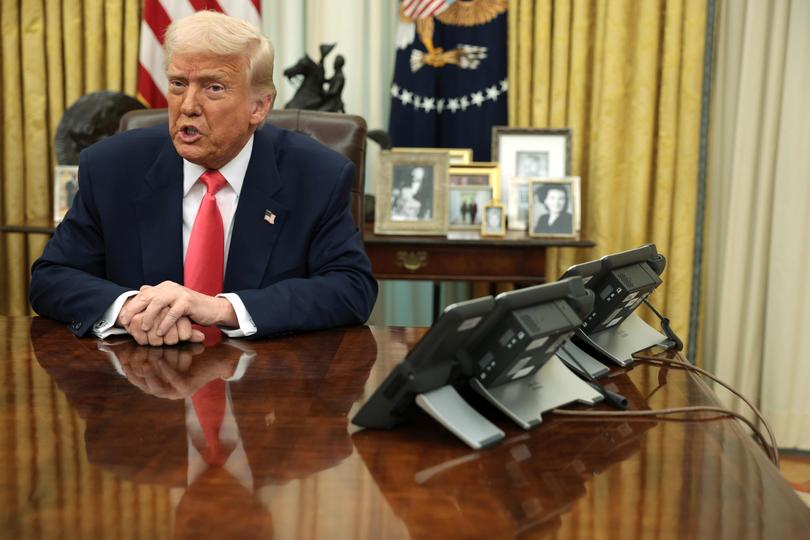THE ECONOMIST: Paul Weiss and big law’s capitulation to Donald Trump could be bad for business
US President Donald Trump’s attacks on four major legal firms have rivals circling to poach potential partners. But putting self-interest above the rule of law will have major repercussions for everyone.

It passes for a courtroom truism that whoever wins or loses, the lawyers come out on top — especially in litigious America. The same goes for political outcomes.
Had Kamala Harris and the Democratic Party won the presidential and congressional elections in November, white-shoe firms would have expected less work on mergers and acquisitions (M&A) but more representing of corporate clients before regulatory agencies.
With Donald Trump and the notionally pro-business Republicans in charge, you might have guessed the opposite. Either way, billable hours beckoned.
Sign up to The Nightly's newsletters.
Get the first look at the digital newspaper, curated daily stories and breaking headlines delivered to your inbox.
By continuing you agree to our Terms and Privacy Policy.As with many self-evident truths in American life, this president has other ideas. In February he suspended the security clearances of some attorneys at one law firm, Covington & Burling.
Days later, he did the same to all of Perkins Coie, a second, also limiting its employees’ access to federal buildings and officials, among various other sanctions.
Then he lashed out at a third, Paul Weiss. On March 25, he hit one more, Jenner & Block.
Along the way, he issued a memo targeting anyone who impedes Making America Great Again with “frivolous, unreasonable and vexatious litigation”. Rich coming from someone who, by one count, filed 2,121 lawsuits between 1973 and 2016. Chilling nonetheless.
The four named firms committed the same apparent crime: having ties to hate figures of the MAGA right. Covington & Burling has represented Jack Smith, the special counsel who in 2023 brought criminal charges against Mr Trump.
Perkins Coie worked on a dossier for Hillary Clinton about Mr Trump’s ties to Russia. Paul Weiss once employed someone later involved in an investigation of Mr Trump by the Manhattan district attorney.
Jenner & Block rehired an attorney who helped with an official probe into those Trump-Russia links. Almost as obnoxiously, each firm embraced diversity, equity and inclusion (DEI) in its hiring.
Where the cases diverge is in the firms’ responses. Covington & Burling is trying to keep a low profile. Perkins Coie sued, and won a reprieve from a judge who blocked most of the order as unconstitutional.
On March 19 Paul Weiss settled — or, less charitably, caved — leading Mr Trump to rescind the order. So far Jenner & Block has said it “will pursue all appropriate remedies”. It should think twice before following the path of appeasement.
To be fair to Paul Weiss and its chairman, Brad Karp, who negotiated with Mr Trump, the firm found itself in an impossible situation. It “faced an existential crisis”, Mr Karp wrote in a letter to staff, with “no right answer”.
Even a successful court challenge would not remove it from Mr Trump’s bad graces. Clients were apparently ready to flee. Rivals, instead of closing ranks to protect the profession, were sizing up partners to poach.
Moreover, in Mr Karp’s telling, in practice the deal requires the firm to do little beyond what it is doing anyway. It already takes on clients and hires lawyers regardless of political leanings, and promotes people based on merit not DEI.
It spends $US130 million ($205m) a year on pro-bono work. An extra $US40m it will funnel over four years to “areas of shared interest”, such as combating anti-Semitism, is chump change for a firm that last year made $US1.5b in net profit.
Paul Weiss, it is also true, has more to gain from accommodation than Perkins Coie, which may have reasoned that Mr Trump’s fury over the “Russia hoax” meant no deal was ever on the table. It has more to lose from retaliation, too. Over half its 300-odd partners practise corporate law. More than a third handle private equity. A quarter dabble in M&A.
The respective figures at Perkins Coie are one in four, one in 12 and one in six. Such rainmakers tend to be readier than litigators to jump ship. In America they can take their clients with them. Paul Weiss should know: it has made more than 20 “lateral hires” (lawyer-speak for partner-poaching) at its M&A and private-equity practices in the past few years.
If a handful of top revenue-earners depart, others often follow. Because law firms are owned by partners, this puts strain on their balance-sheets, leading to still more departures.

In 2008 two firms with two centuries of experience between them, Heller Ehrman and Thelen, each folded within a month owing to self-reinforcing partner flight. In the words of John Morley of Yale Law School: “Law firms don’t go bankrupt — they collapse.”
All this doubtless weighed heavily on Mr Karp. Yet he may have overestimated the immediate risks to Paul Weiss and discounted some longer-term costs. (Paul Weiss did not respond to requests for comment.) Large clients such as ExxonMobil, an oil giant, do not switch counsel on a dime.
Paul Weiss partners are “fabulously well-paid” and hard to poach, says a big-law bigwig who has tried. Partners may have stomached a bit less profit if rallied. Taking on the White House would not risk other people’s money, since the firm has no outside shareholders.
Let’s cow all the lawyers
Mr Karp’s concessions are not costless. They may put off as many clients as they placate and make it hard to lure legal eagles. Some 1,600 associates at big firms, including 30 or so at Paul Weiss, have signed an open letter decrying efforts to “weaponise the Executive against the rule of law”. Many may avoid a firm where the government “has a call” on hiring practices, says Bob Bauer of NYU Law School (who was Barack Obama’s White House counsel).
Worse, rather than mollifying the plaintiff-in-chief, Mr Karp’s deal emboldens him. Just ask Jenner & Block.
America is not China or Russia, and lawyers can make money even in such lawless places. But it is the rule of law that underwrites the profession’s prosperity. Without it lawyers are mere consultants.
Ideally, big law would mount a co-ordinated resistance. In its absence, firms have every right to pursue their self-interest. They should remember that anything that erodes the rule of law won’t redound to their benefit. That includes Paul Weiss’s surrender.
